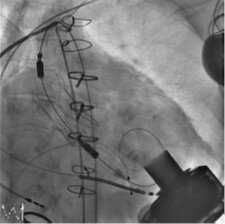Pardo A, Salido L, Jiménez M, Álvarez J, Zamorano JL, Sánchez Á. TAVI With ACURATE neo2 Valve in Aortic Regurgitation Due to Left Ventricular Assist Device: A Custom-Made Option
Circ Heart Fail . 2024
"Revolutionizing Care: Successful ACURATE Neo Valve Implantation for Aortic Regurgitation in LVAD Patients" – Dr. Ana Pardo Sanz
Summary:
Aortic regurgitation (AR) is a common long-term complication in patients with left ventricular assist device (LVAD), with poor outcomes. More than 50% of patients with LVAD develop mild AR at 2 years of support, with increasing prevalence of significant AR over time. Transcatheter aortic valve implantation could be an option for patients with pure AR, with demonstrated feasibility and efficacy. Little is known about patients with AR related to LVAD. We present the first case treated with implantation of the self-expandable valve ACURATE neo2 (Boston Scientific).
In patients with AR related to LVAD undergoing transcatheter aortic valve implantation, the absence of valvular calcification must be considered: a proper prosthesis oversizing should be guaranteed to achieve sufficient sealing and avoid prosthesis migration or paravalvular leak (the most accepted oversizing is around 10%). Additionally, suction from the LVAD may disturb prosthesis deployment and increase the risk of migration. In this context, the self-expanding supra-annular bioprosthetic aortic valve ACURATE neo2 carries design features that may help to anchor the valve.
Why do you highlight this publication?
I highlight this publication because it presents a novel and effective solution for aortic regurgitation, a significant complication in patients with left ventricular assist devices. The case report introduces the successful use of the ACURATE neo valve, demonstrating its potential as a custom-made option for this patient population. Given the challenges associated with aortic regurgitation and its impact on patient outcomes, this report not only contributes valuable insights to the field of heart failure management but also paves the way for future research and clinical applications in similar cases.
Publication commented by:
Dr. Ana Pardo Sanz
Cardiology Department
CARDIOVASCULAR DISEASES GROUP
IRYCIS



